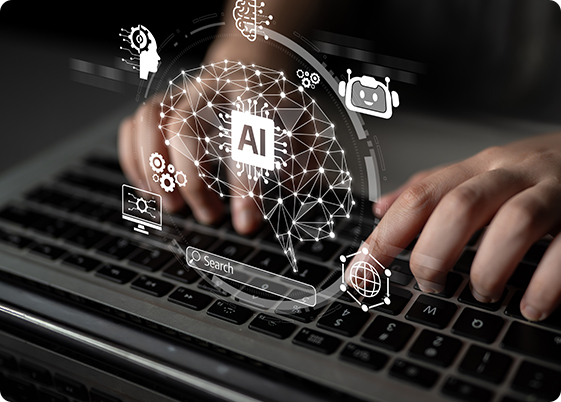
Artificial Intelligence (AI) is transforming industries worldwide, from healthcare and finance to retail and education. With AI systems being integrated into everyday applications, demand for skilled AI engineers is skyrocketing. Many students and professionals now wonder: how to become an AI engineer?
If you’re curious about “what is AI engineering?”, the AI engineer career path, or want to learn about the roadmap to become an AI engineer, this guide will walk you through everything you need to know - skills, education, certifications, job roles, and growth opportunities.
What Is an AI Engineer?
An AI engineer is a technology professional who designs, develops, and deploys artificial intelligence applications, algorithms, and systems. The field blends computer science, data science, mathematics, and domain expertise to create machines that mimic human intelligence.
In short, AI engineering involves building systems that can learn, reason, and make decisions, whether through machine learning models, natural language processing, or computer vision. For anyone asking, how do I become an AI engineer? The answer lies in a structured learning pathway, gaining AI engineering skills, and applying them in real-world projects.

Career Opportunities in AI Engineering
AI engineers enjoy some of the most demanding IT jobs today, as artificial intelligence continues to revolutionise industries such as healthcare, finance, retail, education, and transportation. Choosing a career in AI engineering opens up diverse pathways depending on your skills and interests.
Whether you’re inclined towards hands-on coding, data modelling, product development, or pure research, there is an AI role for you. Below are some of the most popular career options in the AI engineer career path:
AI/ML Engineer
These professionals focus on building and deploying machine learning models. Their work powers real-world applications such as recommendation systems in e-commerce, fraud detection in banking, voice recognition in smartphones, and autonomous driving systems. This role requires deep expertise in programming, algorithms, and data science.
MLOps Engineer
MLOps engineers bridge the gap between machine learning and software engineering. They ensure AI models can be trained, deployed, and scaled in real-world production environments. Automating ML pipelines, optimising workflows, and maintaining model performance are key parts of this role.

Generative AI Engineer
With the rise of generative AI tools like ChatGPT and text-to-image platforms, generative AI engineers are in high demand. They specialise in building and fine-tuning large language models (LLMs) and generative systems for chatbots, creative content, and even business automation.
AI Product Developer
These professionals bring AI-powered applications to life. They combine technical expertise with product management skills to create user-friendly solutions such as AI-driven personal assistants, medical diagnostic tools, or intelligent business analytics platforms.
AI Research Engineer
For those inclined towards academia and innovation, becoming an AI research engineer is a rewarding option. They explore the frontiers of AI—designing new algorithms, advancing deep learning architectures, and developing responsible AI systems.
A career in AI engineering is diverse and dynamic, offering opportunities to make a meaningful impact while being part of the AI engineer roadmap, shaping the future of technology.
Step-by-Step Guide to Becoming an Artificial Intelligence (AI) Engineer
Here’s a structured path to become an AI engineer, whether you’re starting right after school, during college, or switching careers later in life. Following these steps will help you build the essential AI engineering skills needed to succeed in one of the most rewarding tech jobs in India today.
Step 1: Build Strong Programming Foundations
Programming is the first building block in your AI engineer career path. Learn Python, which dominates AI development due to libraries like TensorFlow, PyTorch, and Scikit-learn. Java, R, or C++ can also be useful for specialised projects. A strong understanding of algorithms and data structures is crucial.

Step 2: Learn Mathematics & Statistics for AI
Mathematics is the language of AI. Focus on linear algebra for neural networks, calculus for optimisation, and probability and statistics for model evaluation. These subjects are critical to understanding how AI systems learn and make decisions.
Step 3: Master Machine Learning & Deep Learning
This step involves exploring ML algorithms such as regression, clustering, and support vector machines. Progress to deep learning, where you’ll learn about neural networks, CNNs, RNNs, and reinforcement learning. This knowledge forms the foundation of modern AI.
Step 4: Work With AI Tools & Frameworks
Hands-on practice is vital. Utilise tools such as TensorFlow, PyTorch, and Keras to develop and train AI models. These frameworks make implementing complex architectures more accessible.
Step 5: Get AI Certifications & Courses
Structured learning through online platforms like Coursera, edX, or IIT/IIM programs in India can strengthen your AI engineer roadmap. Certifications add credibility when applying for jobs.

Step 6: Build Projects & Portfolio
Create practical projects, chatbots, predictive analytics tools, or computer vision applications. A strong portfolio demonstrates your problem-solving ability and makes you stand out in the job market.
Step 7: Apply for Internships & Entry-Level Roles
Finally, start applying for internships or entry-level roles such as AI developer, ML engineer, or research assistant. These roles mark the beginning of your AI engineering career and open doors for long-term growth.
Essential Skills Every Aspiring AI Engineer Needs
Artificial Intelligence (AI) is experiencing explosive growth, transforming industries and shaping the future of technology. As AI applications become more sophisticated, the demand for artificial intelligence engineer skills is skyrocketing. For aspiring AI engineers, computer science students, and professionals considering a transition into AI, understanding the critical requirements for AI engineers is necessary for success.
Let’s explore the top 10 must-have skills and qualifications when you want to know how to become an AI engineer. By honing these skills, you can position yourself for a rewarding career in this dynamic field in India.
Programming Proficiency
Strong programming proficiency is one of the most essential skills for an artificial intelligence engineer. Python is the undisputed leader in AI development. It includes numerous libraries and frameworks specifically designed for machine learning and deep learning.
Familiarity with languages like Java, C++, and R can also be beneficial, depending on the project’s specific needs. AI engineer jobs often require expertise in data structures, algorithms, and object-oriented programming principles, which will allow you to design, implement, and optimise complex AI models.
Mathematics and Statistics
A strong understanding of mathematics and statistics is a critical skill required for artificial intelligence (AI) engineers. Linear algebra, calculus, probability theory, and statistics form the bedrock of AI algorithms. They empower you to grasp complex mathematical concepts like gradient descent for training machine learning models.
Statistical knowledge helps you analyse data, identify patterns, and evaluate model performance objectively.
Machine Learning (ML) Algorithms
Machine learning (ML) is a core subfield of AI that enables computers to learn from data without explicit programming. Understanding various ML algorithms like linear regression, decision trees, support vector machines, and ensemble methods is an essential skill for artificial intelligence and machine learning engineers.
You will have to select the correct ML algorithm for a specific problem, such as classification, regression, or clustering. Assessing the strengths and weaknesses of different algorithms allows you to choose the one that best suits the task at hand.
Deep Learning Frameworks
Deep Learning, a subset of ML inspired by the structure and function of the human brain, has revolutionised AI capabilities. Popular deep learning frameworks like TensorFlow, PyTorch, and Keras provide potent tools for building and training complex neural networks. Knowledge of cutting-edge deep learning architectures is another skill required for AI engineers for tasks like image recognition, natural language processing, and generative AI.
Data Handling and Processing
Data is the lifeblood of AI. Being able to wrangle, clean, and process large datasets is a critical skill for AI engineers. AI engineer jobs often involve techniques like data wrangling, exploratory data analysis, feature engineering, and data visualisation. Familiarity with tools like pandas, NumPy, and Matplotlib empowers you to prepare high-quality data for training and evaluating AI models.
Model Evaluation and Tuning
Once you’ve trained an AI model, assessing its performance is necessary. Knowing model evaluation metrics, including accuracy, precision, recall, and F1 score, is a skill needed for AI engineers. Techniques like cross-validation help ensure the model generalises well to unseen data.
These skills help them to fine-tune hyperparameters, the knobs and dials that control the model's learning process—to optimise performance and address issues like overfitting or underfitting.
Natural Language Processing (NLP)
Natural Language Processing (NLP) is a subfield of AI that deals with the interaction between computers and human language. Artificial intelligence engineers with skills in NLP are in high demand for tasks such as sentiment analysis, machine translation, chatbots, and text summarisation.
Understanding techniques like tokenisation, stemming, lemmatisation, and part-of-speech tagging allows practical NLP applications.
Computer Vision
Skills required for artificial intelligence engineers include Computer Vision (CV), which allows computers to extract information from images and videos. This proficiency is highly sought-after, with applications in areas like self-driving cars, medical imaging, and facial recognition.
AI engineer jobs involving CVs require expertise in image processing techniques, convolutional neural networks, and object detection algorithms.
Cloud Computing
The ever-growing complexity of AI models necessitates powerful computing resources. Cloud platforms like Google Cloud Platform (GCP), Amazon Web Services (AWS), and Microsoft Azure offer scalable and cost-effective solutions for training and deploying AI models. Artificial intelligence engineer skills in utilising cloud computing services allow you to leverage vast computing power without needing expensive on-premise infrastructure.
Soft Skills
While technical skills are essential, both technical and soft skills are equally crucial for success as an artificial intelligence engineer. Communication skills enable you to collaborate effectively with team members, stakeholders, and clients. Problem-solving skills are necessary for tackling complex challenges and debugging models. Critical thinking allows you to analyse data objectively and make sound decisions. AI engineer jobs require the ability to explain complex AI concepts to non-technical audiences.
Artificial intelligence engineer skills in storytelling and data visualisation can help bridge the gap and garner support for your projects. Additionally, ethical considerations become paramount as AI continues to reshape various industries. Artificial intelligence engineers should possess an understanding of potential biases in data and algorithms, as well as the ability to develop and implement a responsible AI solution that mitigates these biases.
AI Engineer Career Path in India
If you’re wondering how to become AI engineer after 12th, here’s a quick roadmap:
- Undergraduate Route:Pursue a B.Tech/B.Sc. in Computer Science, Data Science, or AI.
- Postgraduate Route:M.Tech/M.Sc. in AI, ML, or related specialisations.
- Alternative Route:Non-tech professionals can transition via certifications, online bootcamps, and self-learning.
With India becoming a hub for tech jobs, the demand for AI engineers is rising across startups, IT services, and global enterprises.
Conclusion
With AI constantly evolving, opportunities exist for those with the right skills. By mastering these artificial intelligence engineer skills outlined above, you can position yourself for a fulfilling career at the forefront of technological innovation.
Still wondering how to become an AI engineer? Just practice continuous learning and adaptation. Stay curious and explore emerging trends like explainable AI (XAI) and generative AI to contribute to the digital transformation reshaping our world. With dedication and perseverance, you can contribute to shaping the future of AI and its impact on the world.
Are you eager to leverage your AI skills and make a real impact? HGS India is actively seeking talented AI engineers to join our innovative team. Explore our software engineer job openings and see if your perfect opportunity awaits.
FAQs
What are common interview questions for AI Engineers?
Expect questions on ML algorithms, deep learning frameworks, data preprocessing, and system design. Some companies also test your problem-solving using case studies.
How do I gain practical experience in AI projects?
Build a GitHub portfolio with personal projects, participate in Kaggle competitions, and apply for research internships or open-source AI initiatives.
What programming languages should I learn to become an AI engineer?
Python is a must-have. R, Java, and C++ are also useful depending on the role.
What does an AI engineer do?
An AI engineer designs, trains, and deploys AI models for tasks such as automation, predictive analytics, natural language processing, and computer vision applications.
 India
India Canada
Canada Colombia
Colombia Jamaica
Jamaica Philippines
Philippines UK
UK US
US SA
SA



